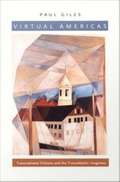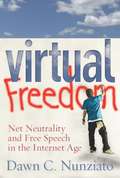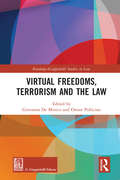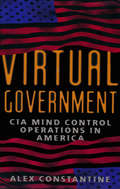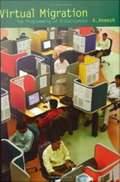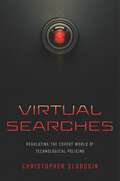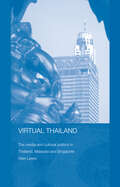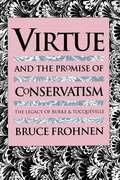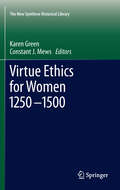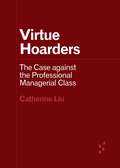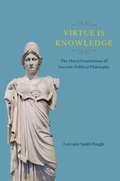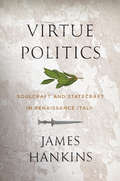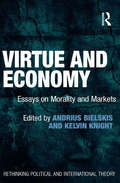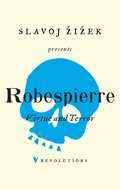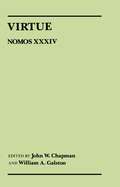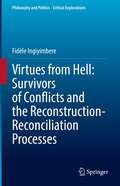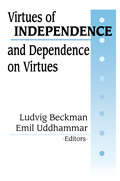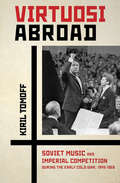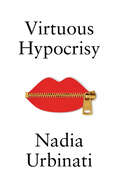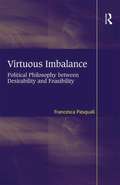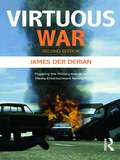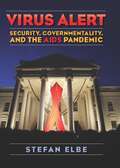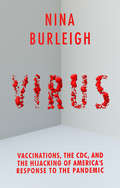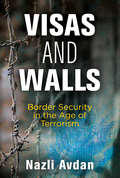- Table View
- List View
Virtual Americas: Transnational Fictions and the Transatlantic Imaginary
by Paul GilesArguing that limited nationalist perspectives have circumscribed the critical scope of American Studies scholarship, Virtual Americas advocates a comparative criticism that illuminates the work of well-known literary figures by defamiliarizing it--placing it in unfamiliar contexts. Paul Giles looks at a number of canonical nineteenth- and twentieth-century American writers by focusing on their interactions with British culture. He demonstrates how American authors from Herman Melville to Thomas Pynchon have been compulsively drawn to negotiate with British culture so that their nationalist agendas have emerged, paradoxically, through transatlantic dialogues. Virtual Americas ultimately suggests that conceptions of national identity in both the United States and Britain have emerged through engagement with--and, often, deliberate exclusion of--ideas and imagery emanating from across the Atlantic. Throughout Virtual Americas Giles focuses on specific examples of transatlantic cultural interactions such as Frederick Douglass's experiences and reputation in England; Herman Melville's satirizing fictions of U. S. and British nationalism; and Vladimir Nabokov's critique of European high culture and American popular culture in Lolita. He also reverses his perspective, looking at the representation of San Francisco in the work of British-born poet Thom Gunn and Sylvia Plath's poetic responses to England. Giles develops his theory about the need to defamiliarize the study of American literature by considering the cultural legacy of Surrealism as an alternative genealogy for American Studies and by examining the transatlantic dimensions of writers such as Henry James and Robert Frost in the context of Surrealism.
Virtual Freedom
by Dawn C. NunziatoCommunications giants like Google, Comcast, and AT&T enjoy increasingly unchecked control over speech. As providers of broadband access and Internet search engines, they can control online expression. Their online content restrictions-from obstructing e-mail to censoring cablecasts-are considered legal because of recent changes in free speech law. In this book, Dawn Nunziato criticizes recent changes in free speech law in which only the government need refrain from censoring speech, while companies are permitted to self-regulate. By enabling Internet providers to exercise control over content, the Supreme Court and the FCC have failed to protect the public's right to access a broad diversity of content. Nunziato argues that regulation is necessary to ensure the free flow of information and to render the First Amendment meaningful in the twenty-first century. This book offers an urgent call to action, recommending immediate steps to preserve our free speech rights online.
Virtual Freedoms, Terrorism and the Law (Routledge-Giappichelli Studies in Law)
by Giovanna De MinicoThis book examines the risks to freedom of expression, particularly in relation to the internet, as a result of regulation introduced in response to terrorist threats. The work explores the challenges of maintaining security in the fight against traditional terrorism while protecting fundamental freedoms, particularly online freedom of expression. The topics discussed include the clash between freedom of speech and national security; the multijurisdictional nature of the internet and the implications for national sovereignty and transnational legal structures; how to determine legitimate and illegitimate association online; and the implications for privacy and data protection. The book presents a theoretical analysis combined with empirical research to demonstrate the difficulty of combatting internet use by terror organizations or individuals and the range of remedies that might be drawn from national and international law. The work will be essential reading for students, researchers and policy makers in the areas of Constitutional law; Criminal Law, European and International law, Information and Technology law and Security Studies.
Virtual Government
by Alex ConstantineCIA Mind Control Operations in America Written and researched by the author of 'Psychic Dictatorship in the USA,' this new work explores the use of mind control techniques by the CIA.
Virtual Migration: The Programming of Globalization
by A. AneeshAneesh draws on the sociology of science, social theory, and research on migration to illuminate the practical and theoretical ramifications of virtual migration.
Virtual Searches: Regulating the Covert World of Technological Policing
by Christopher SloboginChoice Outstanding Academic Title 2023A close look at innovations in policing and the law that should govern themA host of technologies—among them digital cameras, drones, facial recognition devices, night-vision binoculars, automated license plate readers, GPS, geofencing, DNA matching, datamining, and artificial intelligence—have enabled police to carry out much of their work without leaving the office or squad car, in ways that do not easily fit the traditional physical search and seizure model envisioned by the framers of the Constitution. Virtual Searches develops a useful typology for sorting through this bewildering array of old, new, and soon-to-arrive policing techniques. It then lays out a framework for regulating their use that expands the Fourth Amendment’s privacy protections without blindly imposing its warrant requirement, and that prioritizes democratic over judicial policymaking. The coherent regulatory regime developed in Virtual Searches ensures that police are held accountable for their use of technology without denying them the increased efficiency it provides in their efforts to protect the public. Whether policing agencies are pursuing an identified suspect, constructing profiles of likely perpetrators, trying to find matches with crime scene evidence, collecting data to help with these tasks, or using private companies to do so, Virtual Searches provides a template for ensuring their actions are constitutionally legitimate and responsive to the polity.
Virtual Thailand: The Media and Cultural Politics in Thailand, Malaysia and Singapore (Rethinking Southeast Asia)
by Glen LewisWritten by an established expert on Thailand, this is one of the first books to fully investigate the Thai media’s role during the Thaksin government’s first term. Incorporating political economy and media theory, the book provides a unique insight into globalization in Southeast Asia, analyzing the role of communications and media in regional cultural politics. Examining the period from the mid 1990s, Lewis makes a sustained comparison between Thailand and its neighbouring countries in relation to the media, business, politics and popular culture. Covering issues including business development, tourism, the Thai movie industry and the war on terror, the book argues that globalization as it relates to media, can be patterned on Thai experiences.
Virtue And The Promise Of Conservatism: The Legacy Of Burke And Tocqueville
by Bruce FrohnenOften loud and acrimonious, the public tug-of-war between a reinvigorated conservatism and a liberalism in apparent disarray has obscured an equally important competition-that among conservatives themselves. <p><p> In Virtue and the Promise of Conservatism, Bruce Frohnen joins the fray in an effort to rescue the essence of conservative virtue from rationalists and materialists of whatever political stripe. He argues that we have "lost and must attempt to regain the conservative good life and the outlook which made it possible." The tools needed to do that, according to Frohnen, are humility and—yes—political action aimed at combatting the centralizing and materialistic structures and beliefs interfering with the formation and retention of family, church, and neighborhood. <p> Drawing deeply from the writings of Edmund Burke and Alexis de Tocqueville, both critics of untempered reason and "the drive toward a spiritually impoverished egalitarian materialism," Frohnen explores how their work has influenced individuals as diverse as traditionalist Russell Kirk, "apocalyptic" libertarian Michael Oakeshott, and neoconservative Irving Kristol. <p> While differing greatly in their views and prescriptions, these contemporary conservatives, Frohnen shows, are nevertheless united in their desire to preserve the local community's natural and fundamental institutions. This preservation, he argues, requires a renewed faith in and humble acceptance of the essential good contained within these institutions.
Virtue Ethics for Women 1250-1500
by Karen Green Constant MewsThis book locates Christine de Pizan's argument that women are virtuous members of the political community within the context of earlier discussions of the relative virtues of men and women. It is the first to explore how women were represented and addressed within medieval discussions of the virtues. It introduces readers to the little studied Speculum Dominarum (Mirror of Ladies), a mirror for a princess, compiled for Jeanne of Navarre, which circulated in the courtly milieu that nurtured Christine. Throwing new light on the way in which Medieval women understood the virtues, and were represented by others as virtuous subjects, it positions the ethical ideas of Anne of France, Laura Cereta, Marguerite of Navarre and the Dames de la Roche within an evolving discourse on the virtues that is marked by the transition from Medieval to Renaissance thought. Virtue Ethics for Women 1250-1500 will be of interest to those studying virtue ethics, the history of women's ideas and Medieval and Renaissance thought in general.
Virtue Hoarders: The Case against the Professional Managerial Class (Forerunners: Ideas First)
by Catherine LiuA denunciation of the credentialed elite class that serves capitalism while insisting on its own progressive heroism Professional Managerial Class (PMC) elite workers labor in a world of performative identity and virtue signaling, publicizing an ability to do ordinary things in fundamentally superior ways. Author Catherine Liu shows how the PMC stands in the way of social justice and economic redistribution by promoting meritocracy, philanthropy, and other self-serving operations to abet an individualist path to a better world. Virtue Hoarders is an unapologetically polemical call to reject making a virtue out of taste and consumption habits.Forerunners: Ideas First is a thought-in-process series of breakthrough digital publications. Written between fresh ideas and finished books, Forerunners draws on scholarly work initiated in notable blogs, social media, conference plenaries, journal articles, and the synergy of academic exchange. This is gray literature publishing: where intense thinking, change, and speculation take place in scholarship.
Virtue Is Knowledge: The Moral Foundations of Socratic Political Philosophy
by Lorraine Smith PangleThe relation between virtue and knowledge is at the heart of the Socratic view of human excellence, but it also points to a central puzzle of the Platonic dialogues: Can Socrates be serious in his claims that human excellence is constituted by one virtue, that vice is merely the result of ignorance, and that the correct response to crime is therefore not punishment but education? Or are these assertions mere rhetorical ploys by a notoriously complex thinker? Lorraine Smith Pangle traces the argument for the primacy of virtue and the power of knowledge throughout the five dialogues that feature them most prominently—the Apology, Gorgias, Protagoras, Meno, and Laws—and reveals the truth at the core of these seemingly strange claims. She argues that Socrates was more aware of the complex causes of human action and of the power of irrational passions than a cursory reading might suggest. Pangle’s perceptive analyses reveal that many of Socrates’s teachings in fact explore the factors that make it difficult for humans to be the rational creatures that he at first seems to claim. Also critical to Pangle’s reading is her emphasis on the political dimensions of the dialogues. Underlying many of the paradoxes, she shows, is a distinction between philosophic and civic virtue that is critical to understanding them. Ultimately, Pangle offers a radically unconventional way of reading Socrates’s views of human excellence: Virtue is not knowledge in any ordinary sense, but true virtue is nothing other than wisdom.
Virtue Politics: Soulcraft and Statecraft in Renaissance Italy
by James HankinsJames Hankins challenges the view that the Renaissance was the seedbed of modern republicanism, with Machiavelli as exemplary thinker. What most concerned Renaissance political theorists, Hankins contends, was not reforming laws but shaping citizens. To secure the social good, they fostered virtue through a new program of education: the humanities.
Virtue and Economy: Essays on Morality and Markets (Rethinking Political and International Theory)
by Kelvin Knight Andrius BielskisInterest in Aristotelianism and in virtue ethics has been growing for half a century but as yet the strengths of the study of Aristotelian ethics in politics have not been matched in economics. This ground-breaking text fills that gap. Challenging the premises of neoclassical economic theory, the contributors take issue with neoclassicism’s foundational separation of values from facts, with its treatment of preferences as given, and with its consequent refusal to reason about final ends. The contrary presupposition of this collection is that ethical reasoning about human ends is essential for any sustainable economy, and that reasoning about economic goods should therefore be informed by reasoning about what is humanly and commonly good. Contributions critically engage with aspects of corporate capitalism, managerial power and neoliberal economic policy, and reflect on the recent financial crisis from the point of view of Aristotelian virtue ethics. Containing a new chapter by Alasdair MacIntyre, and deploying his arguments and conceptual scheme throughout, the book critically analyses the theoretical presuppositions and institutional reality of modern capitalism.
Virtue and Terror
by Maximilien Robespierre John Howe Slavoj Zizek Jean DucangeRobespierre’s justification of the Terror in the French RevolutionRobespierre’s defence of the French Revolution remains one of the most powerful and unnerving justifications for political violence ever written. It has an extraordinary resonance in a world obsessed with terrorism and appalled by the language of its proponents. Yet today the French Revolution is celebrated as the event which gave birth to a nation built on the principles of Enlightenment. So how should a contemporary audience approach Robespierre’s vindication of revolutionary terror? i ek’s introduction analyzes these contradictions with a prodigious breadth of analogy and reference.
Virtue: Nomos XXXIV (NOMOS - American Society for Political and Legal Philosophy #19)
by John W. ChapmanIn the United States, there exists increasing uneasiness about the predominance of self-interest in both public and private life, growing fear about the fragmentation and privatization of American society, mounting concerns about the effects of institutions-ranging from families to schools to the media-on the character of young people, and a renewed tendency to believe that without certain traditional virtues neither public leaders nor public policies are likely to succeed. In this thirty-fourth volume in The American Society of Legal and Political Philosophy, a distinguished group of international scholars from a range of disciplines examines what is meant by virtue, analyzing various historical and analytical meanings of virtue, notions of liberal virtue, civic virtue, and judicial virtue, and the nature of secular and theological virtue. The contributors include: Jean Baechler (University of Paris-Sorbonne), Annette C. Baier (University of Pittsburgh), Ronald Beiner (University of Toronto), Christopher J. Berry (University of Glasgow), J. Budziszweski (University of Texas), Charles Larmore (Columbia University), David Luban (University of Maryland), Stephen Macedo (Harvard University), Michael J. Perry (Northwestern University), Terry Pinkard (Georgetown University), Jonathan Riley (Tulane University), George Sher (University of Vermont), Judith N. Shklar (Harvard University), Rogers M. Smith (Yale University), David A. Strauss (University of Chicago), and Joan C. Williams (American University).
Virtues from Hell: Survivors of Conflicts and the Reconstruction-Reconciliation Processes (Philosophy and Politics - Critical Explorations #20)
by Fidèle IngiyimbereThis book offers a critical examination of certain ideas and values—such as remembering, forgiveness, story-telling through Truth and Reconciliation Commissions, etc.—that under-gird the transitional practices and mechanisms of societies emerging from conflicts. It does so by making the survivors’ experience the supreme and ultimate judge of the legitimacy of such practices. While many scholars have dealt with these topics, this book provides a unique perspective on them by using personal stories, narratives and memoirs of the survivors as a checking point of the theoretical elaboration of these ideas and values. By means of an existential phenomenological analysis of the situation of survivors of gross human rights violations, the book assesses how many resources are still available to them, so that they can contribute to the processes of reconstruction and reconciliation of their societies. This analysis constitutes the background for reading the rest of the book, which challenges some assumptions and presumptions of transitional practices such as healing through truth-telling, or providing justice through reparations. It does so by presenting nuanced suggestions on the ways survivors can participate in the reconstruction-reconciliation processes, without jeopardizing their own well-being.
Virtues of Independence and Dependence on Virtues
by Ludvig Beckman Emil UddhammarDebate about the concept of virtue is a persistent theme in academic discourse. One strand of thinking attempts to examine and reconstruct ethical theories with the aim of formulating a new morality or ethics. A second strand of thought, more strongly represented in this work, attempts to explore the social and political world deploying the concept of virtue. Thus, this volume crosses the established borders of academic disciplines in order to provide a richer and more comprehensive understanding of the place of virtues in contemporary western societies.The editors hold that the dominating virtue of our culture and society is the virtue of independence. Yet independence, or individual autonomy, is contingent upon a diverse, and so far ill-understood, set of cultural, biological, economic, ethical, and political practices. The idea of individuality is in other words supervening on a web of formal and informal relations. This volume therefore attempts to improve our understanding of the prevailing ethos of independence as well as of the mechanisms and practices sustaining it.Virtues are examined in specific contexts. Authors explore what we can learn about our dependence on virtues from the archaic Greek culture. They examine the relevance of virtue-ethics to the understanding of day-to-day practices. And they look at the place of virtues in understanding the norms of independence and liberty. Other contributions attend to the virtues of independence and its challenges, examining possible philosophical challenges, questioning whether independence is always a virtue, and how the virtues of justice fare given a commitment to the virtues of independence.The final portion of the book explore the empirical consequences of the virtues of independence. Among the questions addressed are how personal independence affects political and economic institutions, and the connections between norms of independence and the growth of modernity. This volume is an important contribution to contemporary understanding of what constitutes virtuous and ethical behavior.
Virtuosi Abroad: Soviet Music and Imperial Competition during the Early Cold War, 1945–1958
by Kiril TomoffIn the 1940s and 1950s, Soviet musicians and ensembles were acclaimed across the globe. They toured the world, wowing critics and audiences, projecting an image of the USSR as a sophisticated promoter of cultural and artistic excellence. In Virtuosi Abroad, Kiril Tomoff focuses on music and the Soviet Union's star musicians to explore the dynamics of the cultural Cold War. He views the competition in the cultural sphere as part of the ongoing U.S. and Soviet efforts to integrate the rest of the world into their respective imperial projects. Tomoff argues that the spectacular Soviet successes in the system of international music competitions, taken together with the rapturous receptions accorded touring musicians, helped to persuade the Soviet leadership of the superiority of their system. This, combined with the historical triumphalism central to the Marxist-Leninist worldview, led to confidence that the USSR would be the inevitable winner in the global competition with the United States. Successes masked the fact that the very conditions that made them possible depended on a quiet process by which the USSR began to participate in an international legal and economic system dominated by the United States. Once the Soviet leadership transposed its talk of system superiority to the economic sphere, focusing in particular on consumer goods and popular culture, it had entered a competition that it could not win.
Virtuous Hypocrisy
by Nadia UrbinatiSpeak your mind, always. Hypocrisy challenges this rule of authenticity, and for this very reason hypocrisy is judged negatively, as intentional inconsistency between thoughts and words, between belief and behaviour. Does this make the hypocrite a silent saboteur of the moral order? A person who hides in the shadows and erodes the foundations of trust? Without trust there is no society, no friendship, no love. But is hypocrisy always reprehensible? Nadia Urbinati argues that society, friendship and love all require a measure of hypocrisy – what she calls ‘virtuous hypocrisy’. If we were always uncompromisingly honest in public, it would be a disaster for everyone. Sometimes it is better to refrain from speaking your mind: hypocrisy can be a form of civility and a sign of maturity and autonomy. And in politics too, a degree of hypocrisy and inconsistency is essential. The important thing is to understand when and within what limits hypocrisy can be justified, and to avoid it becoming systematic and leading to outright lying and deception. Urbinati does not praise hypocrisy unconditionally but argues that a degree of hypocrisy is essential to the smooth functioning of our social and political life. This perceptive reappraisal of a much-maligned concept will be of interest to students and academics in politics and political theory and to a wide general readership.
Virtuous Imbalance: Political Philosophy between Desirability and Feasibility
by Francesca PasqualiWhich kind of methodology should political philosophy endorse to jointly meet its theoretical and practical commitments? Virtuous Imbalance: Political Philosophy between Desirability and Feasibility assesses three paradigmatic cases to explore and explain political philosophy's attempts to answer this important question. Rawls's realistic utopianism, Machiavelli's realism, and Plato's utopianism are examined and explored as Francesca Pasquali presents the proper methodology political philosophy should endorse when attempting to attain equilibrium between the practical and the theoretical. These models are investigated with reference to desirability and feasibility; the former concerning the adequacy of normative principles, the latter the practical possibility of enacting them. Both realism and utopianism are shown to perform important and relevant functions with utopianism providing the criteria for judging political practices and realism developing principles for orienting political actors' conduct. An innovative version of realistic utopianism develops, avoiding the shortfalls detected in previous formulations whilst presenting a methodological strategy that enables political philosophy to play a proper public role, without dismissing theoretical concerns.
Virtuous War: Mapping the Military-Industrial-Media-Entertainment-Network
by James Der DerianVirtuous War is the first book to map the emergence and judge the consequences of a new military-industrial-media-entertainment network. James Der Derian takes the reader from a family history of war and genocide to new virtual battlespaces in the Mojave Desert, Silicon Valley, Hollywood and American universities. He tracks the convergence of cyborg technologies, video games, media spectacles, war movies, and do-good ideologies that produced a chimera of high-tech, low-risk ‘virtuous wars’. In this newly updated edition, he reveals how a misguided faith in virtuous war to right the wrongs of the world instead paved the way for a flawed response to 9/11 and a disastrous war in Iraq. Blinded by virtue, emboldened by technological superiority, seized by a mimetic terror, the US blundered from one foreign fiasco to the next. Taking the long view as well as getting up close to the war machine, Virtuous War provides a compelling alternative to the partisan politics, instant analysis and technical fixes that currently bedevil US national security policy.
Virus Alert: Security, Governmentality, and the AIDS Pandemic
by Stefan ElbeBound up with the human cost of HIV/AIDS is the critical issue of its impact on national and international security, yet attempts to assess the pandemic's complex risk fail to recognize the political dangers of construing the disease as a security threat. The securitization of HIV/AIDS not only affects the discussion of the disease in international policy debates, but also transforms the very nature and function of security within global politics.In his analysis of the security implications of HIV/AIDS, Stefan Elbe addresses three concerns: the empirical evidence that justifies framing HIV/AIDS as a security issue, the meaning of the term "security" when used in relation to the disease, and the political consequences of responding to the AIDS pandemic in the language of security. His book exposes the dangers that accompany efforts to manage the global spread of HIV/AIDS through the policy frameworks of national security, human security, and risk management. Beyond developing strategies for mitigating these dangers, Elbe's research reveals that, in construing the AIDS pandemic as a threat, policymakers and international institutions also implicitly seek to integrate current security practices within a particular rationalization of political rule. Elbe identifies this transformation as the "governmentalization" of security and, by drawing on the recently translated work of Michel Foucault, develops a framework for analyzing its key elements and consequences.
Virus: Vaccinations, the CDC, and the Hijacking of America's Response to the Pandemic
by Nina BurleighNew York Times bestselling author Nina Burleigh weaves together the key narrative strands to create an uncompromising and highly informed expose about our shared global pandemic experience and what it means for our future Virus: Vaccinations, the CDC, and the Hijacking of America&’s Response to the Pandemic takes readers on an extraordinary journey from the medical science of viruses and vaccines, to conspiracy theories, through the history of knowledge, to the precipice—where we are now—of uncertainty about the future. This is not a book for those who think they already know how the story ends, but one that asks the tough questions in terse, hard-hitting paragraphs and chapters. Virus walks a tightrope wire, in the same way that nearly all Americans are already doing, and does not presume our lives will be saved by any one approach or answer, or that any side has ownership of the truth, but puts us on a path towards a better understanding of what just happened to us and where we&’re likely to be headed when, not if, the next virus appears. Here is: • The true story behind the triumph of science in an era of unprecedented science denialism; • The other true story of government malfeasance that brought the U.S. to its knees and saw more Americans die from the pandemic than in any other nation; • An eye-opening series of interviews with researchers and creators of the mRNA vaccine, its test subjects, and other key figures; • The history behind one of the great medical milestones: the astonishingly fast development and clinical deployment of the first mRNA vaccine, and how it will change the way medicine is practiced in the future; • The alternate reality of bizarre conspiracy theories that undergird pandemic denialism and vaccine hesitancy; • The return of eugenics and how shock doctrine capitalism, crony corruption and extreme free ideology killed people of color, the poor, and the frail; • An assessment of the lessons learned and opportunities lost and what this will mean for the future of our democracy and our people. Virus includes original research and interviews with many key figures and experts including MIT engineer (&“The Edison of Medicine&”) and Moderna founder Robert Langer, Stanford microbiologist David Relman, first mRNA clinical trial (Seattle) participant Missy Pena, medical anthropologist Martha Louise Lincoln, among many others, and a deep reading of publicly available documents and reporting.
Visas and Walls: Border Security in the Age of Terrorism
by Nazli AvdanBorders traditionally served to insulate nations from other states and to provide bulwarks against intrusion by foreign armies. In the age of terrorism, borders are more frequently perceived as protection against threats from determined individuals arriving from elsewhere. After a deadly terrorist attack, leaders immediately encounter pressure to close their borders. As Nazli Avdan observes, cracking down on border crossings and policing migration enhance security. However, the imperatives of globalization demand that borders remain open to legal travel and economic exchange. While stricter border policies may be symbolically valuable and pragmatically safer, according to Avdan, they are economically costly, restricting trade between neighbors and damaging commercial ties. In Visas and Walls, Avdan argues that the balance between economics and security is contingent on how close to home threats, whether actual or potential, originate. When terrorist events affect the residents of a country or take place within its borders, economic ties matter less. When terrorist violence strikes elsewhere and does not involve its citizens, the unaffected state's investment in globalization carries the day.Avdan examines the visa waiver programs and visa control policies of several countries in place in 2010, including Turkey's migration policies; analyzes the visa issuance practices of the European Union from 2003 until 2015; and explores how terrorism and trade affected states' propensities to build border walls in the post-World War II era. Her findings challenge the claim that border crackdowns are a reflexive response to terrorist violence and qualify globalists' assertions that economic globalization makes for open borders. Visas and Walls encourages policymakers and leaders to consider more broadly the effects of economic interdependence on policies governing borders and their permeability.
Viscount Haldane
by Frederick VaughanViscount Richard Burdon Haldane was a philosopher, lawyer, British MP, and member of the British Cabinet during the First World War. He is best known to Canadians as a judge of the Judicial Committee of the Privy Council (Canada's highest court of appeal until 1949), in which role he was extremely influential in altering the constitutional relations between the federal parliament and the provincial legislatures.Chafing under the British North America Act of 1867, which provided for a strong central government, the provincial governments appealed to the Judicial Committee and were successful in gaining greater provincial legislative autonomy through the constitutional interpretations of the law lords. In Viscount Haldane, Frederick Vaughan concentrates on Haldane's role in these rulings, arguing that his jurisprudence was shaped by his formal study of German philosophy, especially that of G.W.F. Hegel. Vaughan's analysis of Haldane's legal philosophy and its impact on the Canadian constitution concludes that his Hegelian legacy is very much alive in today's Supreme Court of Canada and that it continues to shape the constitution and the lives of Canadians since the adoption of the Canadian Charter of Rights and Freedoms.
